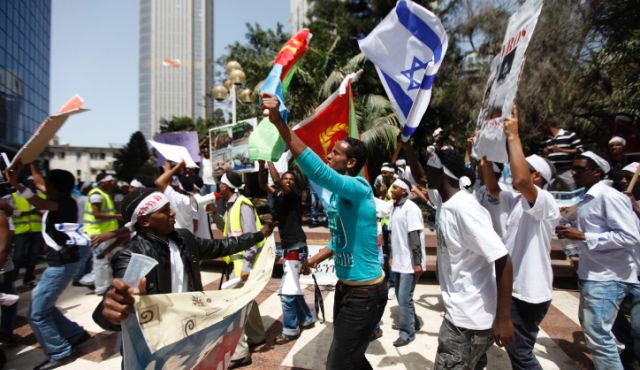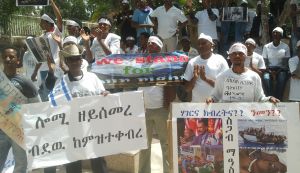Eritrean demonstrators claim Israel ignores rights abuses in their country
By Dana Weiler-Polak | May.25, 2012 | 12:05 PM |
At Eritrean Independence Day protest, migrants claim Israel maintains warm relations with Isaias Afwerki's regime, despite human rights abuses; say fleeing these abuses, not employment, is the reason they are in Israel.

Some 200 Eritreans demonstrating outside the Eritrean embassy in Israel on Friday against the regime of President Isaias Afwerki, claimed that Israel ignores the country's human rights abuses because Eritrea is a strategic ally.
The demonstration to mark Eritrean Independence Day, outside the Embassy in Ramat Gan, is part of a number of protests that are taking place in cities across the world. Afwerki, Eritrea's first president, has held the position since 1993.
Community leaders at the protest who asked to remain nameless explained that Israel is apparently refraining from imposing economic sanctions against the country because of its strategic importance for Israel.
"The whole world knows what is happening in Eritrea and Israel continues to turn a blind eye, and even maintain warm relations with Isaias Afwerki, perhaps because the country has strategic value in the fight against Iran," they said.
 The demonstrators carried a sign bearing a quote of Deputy Foreign Minister Danny Ayalon that, "Eritrea is known in the international community as a country that does not safeguard human rights, and anyone who returns there is in danger, including danger of death," a statement he reportedly made in October last year at a meeting of the Knesset Foreign Workers Committee.
The demonstrators carried a sign bearing a quote of Deputy Foreign Minister Danny Ayalon that, "Eritrea is known in the international community as a country that does not safeguard human rights, and anyone who returns there is in danger, including danger of death," a statement he reportedly made in October last year at a meeting of the Knesset Foreign Workers Committee.
Demonstrators on Friday carried signs in English saying, "Stop rape, torture and organ trafficking," and "Isaias Afwerki, the Eritrean nation wants to return to its homeland."
Protesters were also shouting together "We need justice," "We need democracy," and "Stop the torture in the Sinai."
Regarding the recent tensions in Tel Aviv amid anti-migrant protests, they said, " We do not blame the residents of the neighborhoods, but the politicians who come out with untrue allegations that we came here to work. Everyone sees the pictures of torture in Eritrea and the Sinai. Would someone go through this to work in Israel?"
They added that they would be happy if people realized that the Eritreans are just people who want to live their lives quietly.
"We are here today for two reasons," explained Mologata Tomzahi, an Eritrean asylum seeker. "It is important to emphasize to Israelis that this embassy does not represent us. This is the embassy of a country that persecutes its people. Anyone who utters the word democracy ends up either arrested or dead."
"It is also important for us to say that we crave returning to our homeland. We did not come to Israel to work but because in our country we are sentenced to death. We call on every Eritrean citizen in the Diaspora to unite and act to oust Afwerki, and to establish a democracy like in Israel," he added.
Regarding recent tension over African migrants in Israel, one protester, who has been living in Israel for two years, said, "The last few weeks have not been easy, when you can feel the hate in the streets. Over the last few days, the demonstrations have created a lot of hatred, and when we try to explain that we fled murder and torture no one is interested. We did not believe that things like this could happen in a democracy like Israel."
Demonstrators and Knesset members took part in an anti-migrant protest on Wednesday in South Tel Aviv, and following the rally, angry demonstrators went on a rampage, attacking African passers-by and journalists, breaking into and looting shops associated with the African migrant community and shattering car windshields.
A number of Likud MKs addressed Wednesday's rally in Tel Aviv's Hatikva neighborhood, including Miri Regev, Danny Danon and Yariv Levin.
Seventeen Israelis were arrested during the protest. Twelve of them were later released to house arrest.
Regev, who said during the rally that "the Sudanese are a cancer in our body," told Haaretz, "I condemn any violence from any side, but I understand the rage and hurt of the residents, of the families that live there. They tell us: 'Help us. We are being humiliated, look how we live, we are afraid to leave the house.'"


![[AIM] Asmarino Independent Media](/images/logo/ailogo.png)